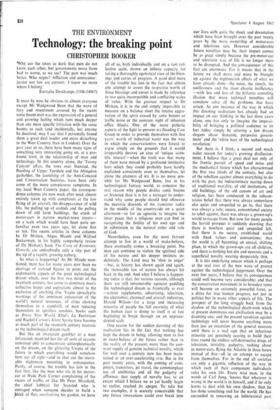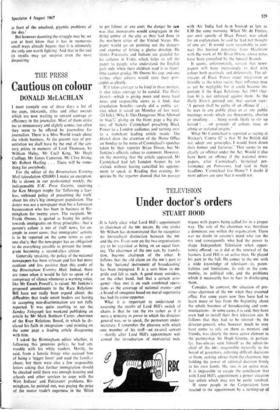Technology: the breaking point
THE ENVIRONMENT CHRISTOPHER BOOKER
'Why are the times so dark that men do not know each other, but governments move from bad to worse, as we see? The past was much better. Who reigns? Affliction and annoyance: justice nor law are current: I know no more where I belong.'
Eustache Deschamps (1346-1406?)
It must by now be obvious to almost everyone except Mr Wedgwood Benn that the wave of fury and resentment aroused by the recent sonic boom tests was the expression of a general and growing feeling which runs much deeper than any mere specific irritation with the sonic booms as such (and incidentally, lest anyone be deceived, may I say that I personally found them a great deal louder and more disturbing in the West Country than in London). Over the past year or so, there have been many signs of something very interesting going on, at a pro- found level, in the relationship of man and technology. In this country alone, the 'Torrey Canyon' affair, the rows over Stansted, the flooding of Upper Teesdale and the Abingdon gasholder, the launching of the Anti-Concord and Conservation Societies, have been only some of the more conspicuous symptoms. In my local West Country paper, the correspon- dence columns are now week after week almost entirely taken up with complaints at the low flying of jet aircraft, the disappearance of wild life, the pulling up of orchids and the pulling down of old farm buildings, the crush of motor-cars in narrow market-town streets— on a scale which would have been quite un- familiar even two years ago, let alone five or ten. The recent articles in these columns by Dr Mishan, Angus Maude and Wilfred Beckerman, in his highly sympathetic review of Dr Mishan's book The Costs of Economic Growth, are undoubtedly only a tiny part of the tip of a rapidly growing iceberg.
So what is happening? As Mr Maude men- tioned, there has for many years now been no shortage of isolated figures to point out the nightmarish aspects of the great technological dream which, over the first two thirds of the twentieth century, has come to dominate man's collective hopes and aspirations almost to the exclusion of anything else. Vague apocalyptic warnings of the imminent exhaustion of the world's natural resources, of cities choking themselves to a standstill, of men reducing themselves to spiritless zombies, books such as Brave New World, Ellul's La Technique and Rachel Carson's Silent Spring have become as much part of the twentieth century neurosis as the technological dream itself.
But like an inveterate gambler or a man infatuated, mankind has for all sorts of reasons remained able to concentrate schizophrenically on the dream, on the glittering Utopia of the future in which everything would somehow turn out all right—and to shut out the inevit- able nightmare mounting in consequence. Partly, of course, the trouble has lain in the fact that, like the man who sits in his motor- car at Hyde Park Corner complaining of the excess of traffic, or like Mr Peter Masefield, the chief lobbyist for Stansted who is outraged when someone decides to build a )lock of flats overlooking his garden, we have all of us, both individually and on a vast col- lective scale, shown an infinite capacity for taking a thoroughly egotistical view of the bless- ings and curses of progress. A good deal more of the trouble has lain in the fact that almost any attempt to assess the respective worth of those blessings and curses is made by reference to two quite incompatible and conflicting scales of value. With the greatest respect to Dr Mishan, it is in the end simply impossible to measure on a balance sheet the intense aggra- vation of the spirit caused by sonic booms or traffic noise or the constant sight of inhuman office blocks. One of the more pathetic aspects of the fight to prevent la flooding Cow Green in order to provide themselves with five years' worth of industrial water was the way in which the conservationists were forced to argue simply on the grounds that it would irreparably destroy an area of 'unique scien- tific interest'—when the truth was that many of them were• moved by a profound instinctive hurt which they could probably have hardly explained consciously even to themselves, let alone the planners of to. It is no more pos- sible for Mr Wedgwood Benn, lost in his technological fantasy world, to conceive the real reason why people dislike sonic booms or Stansted than it is for a teenager to under- stand why some people should find offensive the neurotic discords of his transistor radio in the middle of the countryside on a quiet afternoon—or for an agnostic to imagine the inner peace that a religious man can find in recognising the futility of his own ego and in submission to the natural order and rule of God.
Nevertheless, even for the most fervent attempt to live in a world of make-believe, there eventually comes a breaking point. No man can continue to violate the spiritual side of his nature and his deeper instincts in- definitely. The Lord may be 'slow to anger' —but, as history has shown again and again, the inexorable law of nature has always hit back in the end. And what I believe is happen- ing today is that, for various reasons, although there are still innumerable agencies peddling the technological dream as frantically as ever —colour supplements, advertising, television, the electronics, chemical and aircraft industries, Harold Wilson—for a large and increasing minority of people the full enormity of what the human race is doing to itself is at last beginning to break through on an unprece- dented scale.
One reason for the sudden dawning of this realisation lies in the fact that nothing has kept the dream in being, allowing man to live in make-believe of the future rather than in the reality of the present, more than the con- stant supply of genuine technical novelty, which for well over a century now has been main- tained at an ever-accelerating rate. But in the past twenty years, with the coming of com- puters, transistors, jet travel, the commonplace use of antibiotics and all the gadgetry of affluence, that supply of novelty has, to an extent which I believe we as yet hardly begin to realise, reached its apogee. To take but two examples, it is scarcely conceivable that any future innovations could ever break into our lives with quite the shock and devastation which have been brought over the past twenty years by the mass ownership of motor-cars and television sets. However considerable future novelties may be, their impact cannot be as great simply because the pre-motor-car and television way of life is no longer there to be disrupted. And the consequences of this fact are enormous. For it means that in the future we shall more and more be brought up against the nightmarish effects of what we have already done—the noise, the stench, the soullessness and the sheer chaotic inefficiency —with less and less of the hitherto consoling illusion that more technical novelties will somehow solve all the problems that have arisen. As one instance of the way in which this dawning realisation has already had an impact on our thinking in the last three years alone, one has only to imagine the impossi- bility of bringing a political audience to its feet today simply by uttering a few dream slogans about 'dynamic, purposive govern- ment' and the 'white heat of the technological revolution.'
But there is, I think, a second and much wider reason for today's growing disillusion- ment. I believe that a great deal not only of the frantic pursuit of speed and noise and the mechanical future which has characterised the first two thirds of the century, but also of the rebellion against almost everything' to do with the past, the indiscriminate tearing• down of traditional morality, of old institutions, of old buildings, of the old canons of art and religion, has been conducted in the subcon- scious belief that there was always somewhere else quiet and unspoiled to go to, that there was always a safe, secure, conventional society to rebel against, there was always a grown-up's world to escape from. But now for many people the horrid prospect is suddenly dawning that there is nowhere quiet and unspoiled left, that there is no secure, established world with fixed values and conventions; that the world is all becoming an unreal, shifting place, in which the grown-ups are all children, and there is nothing but din and neurosis and a superficial novelty wearing desperately thin.
It is this underlying unease which is perhaps at the real root of the new wave of protest against the technological juggernaut. Over the next few years, I believe that its consequences could well become very considerable; and that the conservation movement in its broadest sense will become an extremely powerful force, as a drive for true human progress, not just in politics but in many other aspects of life. The prospect of the long struggle back from the shadow of the technological death-wish which at present dominates our civilisation may be a daunting one; and the present revulsion against technology will -never become anything more than just an extension of the general neurosis until there is a real sign that an infectious minority are genuinely ceasing to build their lives round the endless self-destructive drugs of television, triviality, gadgetry, rushing about in motor-cars, flying the Atlantic in three hours instead of five--all in an attempt to escape from themselves. For in the end all societies are only a gigantic reflection of the way in which each of their component individuals rules his own life. Every wise man, in the words of Carl Jung, 'knows that whatever is wrong in the world is in himself, and if he only learns to deal with his own shadow, then he has done something real for the world. He has succeeded in removing an infinitesimal part at least of the unsolved, gigantic problems of the day.'
But however daunting the struggle may be, we can at least know that it has in numerous small ways already begun; that it is ultimately the only one worth fighting. And that in the end its results. may yet surprise even the most despairing.































 Previous page
Previous page